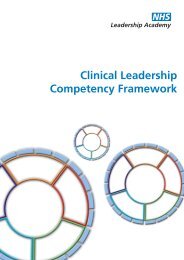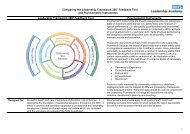Healthy NHS Board: a review of - NHS Leadership Academy
Healthy NHS Board: a review of - NHS Leadership Academy
Healthy NHS Board: a review of - NHS Leadership Academy
Create successful ePaper yourself
Turn your PDF publications into a flip-book with our unique Google optimized e-Paper software.
3 Role <strong>of</strong> <strong>NHS</strong> boards<br />
The English Department <strong>of</strong> Health’s response<br />
to the final report <strong>of</strong> the Mid Staffordshire <strong>NHS</strong><br />
Foundation Trust public inquiry (Francis, 2013)<br />
states that boards ‘have the principal responsibility<br />
for ensuring that care in their organisations is safe<br />
and that those who use their services are treated<br />
as individuals, with dignity and compassion’<br />
(Department <strong>of</strong> Health, 2013c). Below, we present<br />
how recent research and guidance suggest<br />
boards might achieve this through their roles <strong>of</strong><br />
formulating strategy, ensuring accountability, and<br />
shaping culture.<br />
Broadly, the lessons on board roles and priorities<br />
presented in our original <strong>review</strong> are supported by the<br />
guidance and research to have emerged since 2010.<br />
However, there are some areas <strong>of</strong> change, which we<br />
summarise here.<br />
In ‘formulating strategy’, the patient is now the key<br />
priority, and stakeholder engagement is presented as<br />
central to achieving this. ‘Ensuring accountability’ is<br />
now described in terms <strong>of</strong> supporting engagement and<br />
ultimately stakeholder trust. In support <strong>of</strong> this, clarity and<br />
candour are important: boards should prioritise reporting<br />
poorer performance and this information should be<br />
provided in a form that is accessible to all stakeholders.<br />
‘Shaping culture’ has been increasingly recognised as<br />
important. We describe how recent research contributes<br />
to our understanding <strong>of</strong> how cultures might contribute<br />
to quality, innovation and performance, and how<br />
engagement and particular techniques such as ‘Schwartz<br />
Centre Rounds’ might support this. We outline how<br />
facilitating innovation is increasingly prioritised and how<br />
it is potentially influenced by organisational culture; we<br />
also describe how it might be stimulated by engaging<br />
leadership, but stymied by excessive monitoring.<br />
The board priorities identified in our original <strong>review</strong> -<br />
quality and safety, innovation, productivity, population<br />
health, and equality and diversity - have retained their<br />
importance since our original <strong>review</strong>. Evidence indicates<br />
that boards in the English <strong>NHS</strong> have made some<br />
progress in prioritising these issues, but also that there<br />
is still room for improvement, both at board level and at<br />
the front line. Organisational culture and staff wellbeing<br />
may have particularly important relationships with<br />
quality <strong>of</strong> care. We suggest that ongoing engagement<br />
with staff, patients and the public might support further<br />
progress in delivering on these priorities.<br />
Throughout this section, we note that in the context<br />
<strong>of</strong> <strong>NHS</strong> Foundation Trusts the role and potential<br />
contribution <strong>of</strong> governors to board governance has<br />
grown significantly. We also note that, so far, progress<br />
in this area has been limited and we outline potential<br />
benefits <strong>of</strong> boards empowering their governors through<br />
greater engagement and training.<br />
3.1 Formulating strategy<br />
Most <strong>of</strong> the recently published guidance confirms<br />
the broad principles <strong>of</strong> formulating strategy<br />
outlined in our original <strong>review</strong>. However, in some<br />
cases the emphasis has shifted.<br />
Central to recent recommendations on providing<br />
high quality care is that patients’ interests need<br />
to be prioritised in all <strong>NHS</strong> boards’ work (National<br />
Quality <strong>Board</strong>, 2011, Francis, 2013). The revised <strong>NHS</strong><br />
Constitution reflects this, with the principle ‘<strong>NHS</strong><br />
services must reflect the needs and preferences <strong>of</strong><br />
patients, their families and their carers’ (Department <strong>of</strong><br />
Health, 2008) replaced with ‘The <strong>NHS</strong> aspires to put the<br />
patient at the heart <strong>of</strong> everything it does’ (Department<br />
<strong>of</strong> Health, 2013b); in addition, the list <strong>of</strong> <strong>NHS</strong> values has<br />
been brought forward to sit next to ‘<strong>NHS</strong> Principles’ and<br />
within, the value ‘working together for patients’ is now<br />
the first value listed (Department <strong>of</strong> Health, 2013b).<br />
Recent research and guidance emphasise the<br />
importance <strong>of</strong> balancing national and local priorities<br />
in board strategy (Storey et al., 2010b, Institute <strong>of</strong><br />
Chartered Secretaries and Administrators, 2011).<br />
www.leadershipacademy.nhs.uk 15











